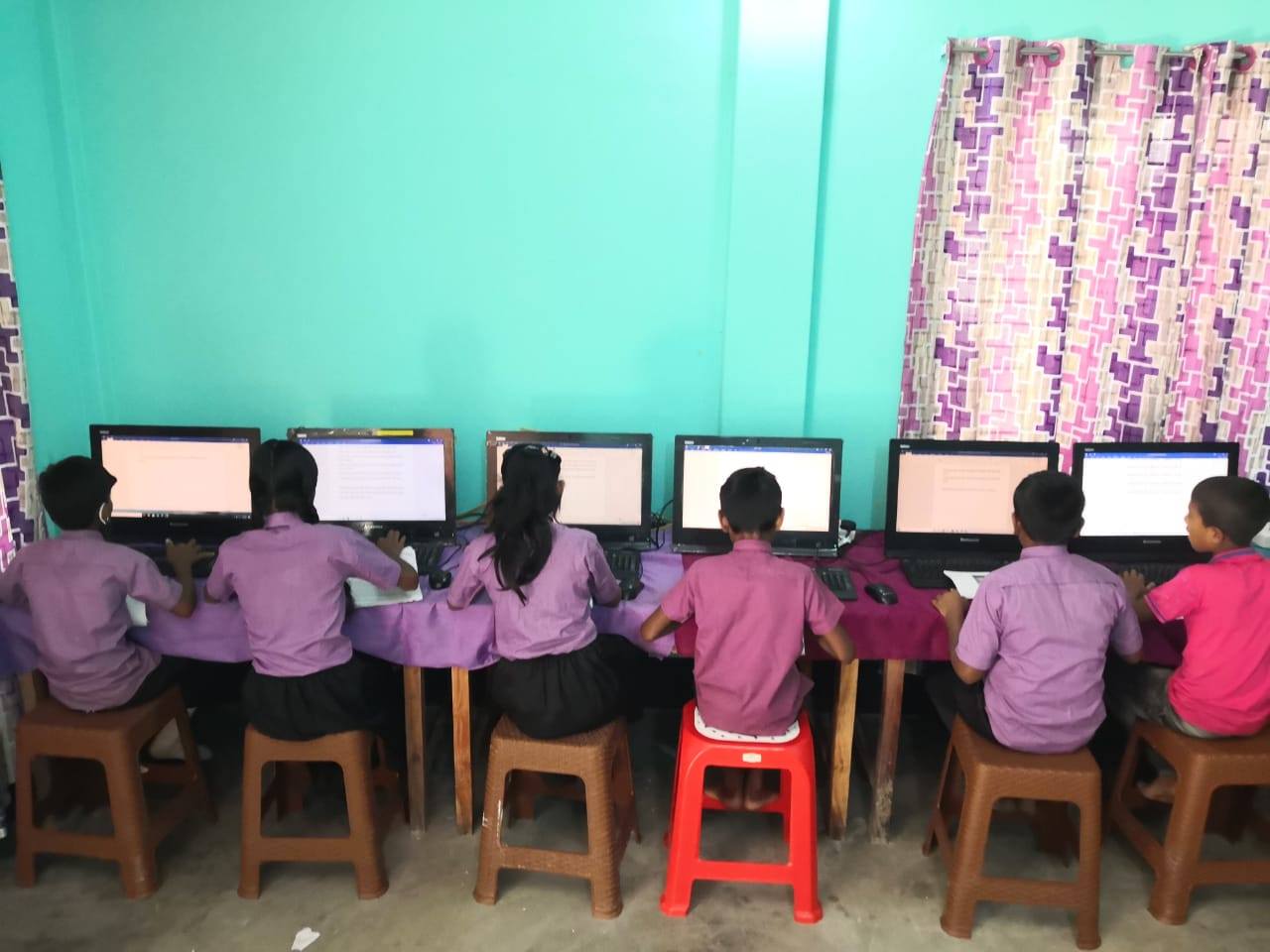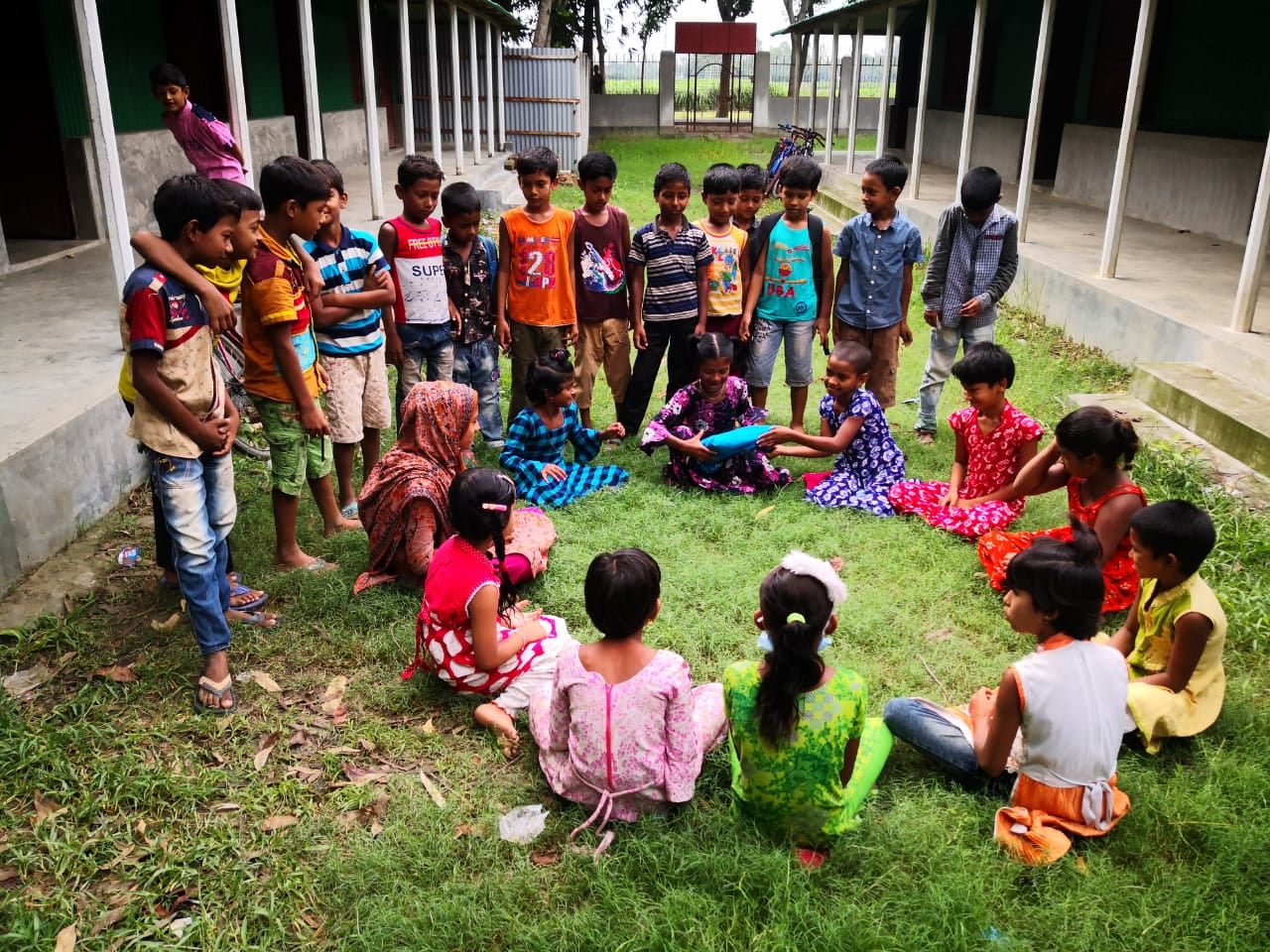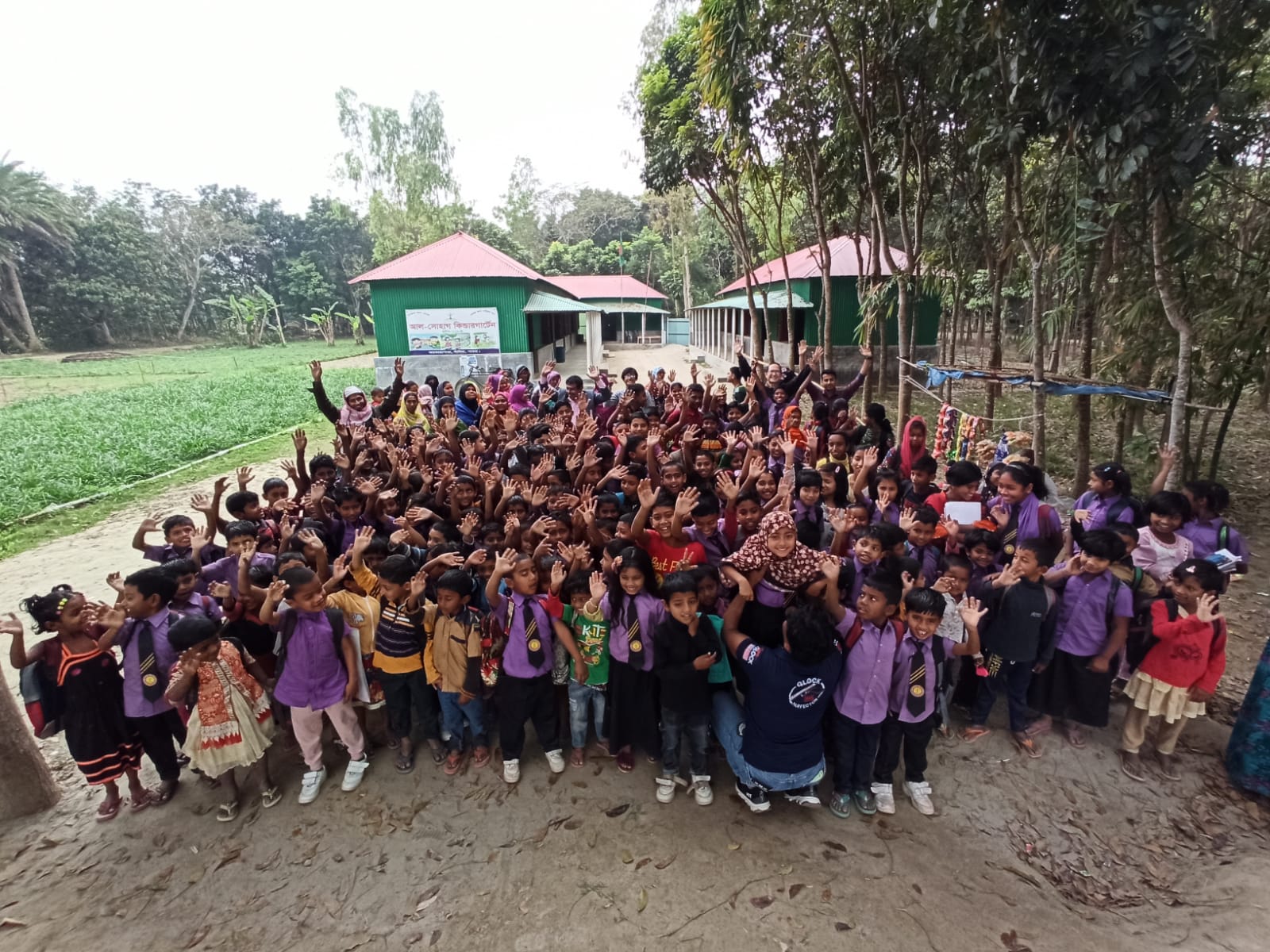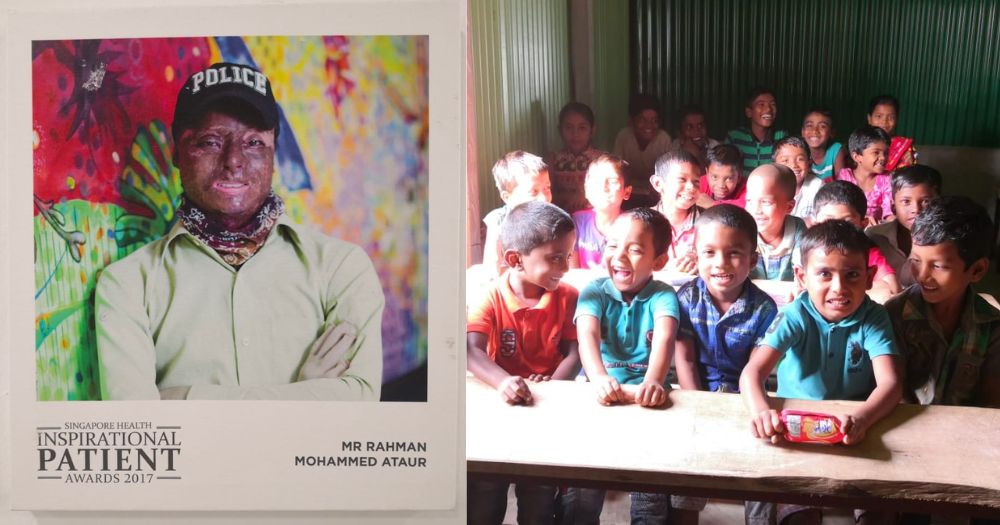PERSPECTIVE: “I want to develop from the roots, to help their future. If their roots will be strong, whatever they go, they can do, will be better.”
As a child, Rahman Mohammad Ataur had a passion for education, but he was unable to finish his studies as his parents couldn’t afford the school fees and needed him to help them with farming.
In March 2015, at the age of 20, Rahman came to Singapore to work as a construction worker and earn money for his family. On Jul. 25, 2016, Rahman was doing work in an underground water tank when an explosion occurred, leaving him and another Bangladeshi worker severely injured.
Rahman, who suffered burns on 73 per cent of his body, was in a coma for three months and spent many more recovering.
In 2018, he was awarded compensation for his injuries and returned home to Bangladesh.
Since then, he has used a large proportion of his compensation money to build and run a school — Al-Shohag — for students in his village, so they can have the opportunity to access education that he didn’t get.
More than two years on from starting Al-Shohag, Rahman shares his motivations behind starting the school, why he wants to do things differently from other schools in rural Bangladesh, and why he is dedicated to keeping his dream running no matter the odds.
By Rahman Mohammad Ataur, as told to Jane Zhang
[As a child,] I had a hunger to do study, but I couldn't get it.
I grow up in village and my parents were uneducated and doing farming work. My family background wasn’t so good, quite poor. They couldn’t provide school fees. This is the main reason I could not continue to go to school.
I liked school that time, but the problem was, I cannot go to school every day because I had to work with my parents in the fields.
My dad would say, “Today I need your help, so you can’t go to school today.” So I have to help and many times I was absent from my school also.
I was studying in primary school, but the school didn’t care. If you are missing, it’s okay. They are not really calling the parents.
Deciding to start a school
When I returned to Bangladesh [after my accident], I saw around my village, kids just running around. They don’t go to school, and they don’t have proper school also.
So then I think, is there something I can do for them?
From this realisation, I started to do. I had some money from my workman compensation, so that money I can use to do.
I share [my idea] with my friends in Singapore. And also I share with some people [here] who are have experience teaching. I talked to the teachers, I talked to a principal, and I also talked to the land owner.
I got good response from the teachers. They said, “If you want that, we’ll join you.”
The principal said, “If you want to do that, I can help you with the management side. It’s a good thing to do.”
Then I had to build the school. I liked this location, because it was close to the road, and if I build there, it’s easy for the students to come.
We started to build up the school. And because it’s at the roadside — on a main road that three or four villages use to go home — everybody go there asking, “What happened? What is that?”
So I put a banner saying that this will be a school.
People start come to me and say, “My son want to admit to your school. What you going to do? How you going to teach?”
Many wants to enrol their children to the school.
And also sometimes I would go and convince them, in the beginning.
Opening school and getting students
We officially started in January 2020, and before that we also started maybe two months earlier.
At the beginning, in the first year, I had 218 students and 13 teachers.
After the first year, we had 30 students graduated from Primary 5 [the final year of Primary school] at my school, and last year 30 students graduated.
[Our school] is very different. You can compare with our primary school. [In other] primary school, they teach them government book, very limited.English they have, but not grammar part or also the other activities like science and art at the beginning.
Many students, when they graduate from primary school, they not even able to read or write the Bengali language. Most of them they cannot even write their name in English. Very sad, that makes me very sad.
So then when they finish their secondary school and they look for job out of country — like some want to go for construction worker — how they going deal if they have minimum knowledge about English?
My English was very bad, but I also learn from Singapore more. That’s why I could realise the problem.
[And other schools] don’t teaching computer, don’t have computer lesson but we have, for the older students. I teach them how to use desktop computer.
 Photo via Facebook/Al-Shohag Kindergarten.
Photo via Facebook/Al-Shohag Kindergarten.
Now, in the current situation, if you have a higher certification but you don’t have computer knowledge, it’s very hard to find a job.
Individual care and attention for students
This community we belong to, they are thinking, “If my son can work today for 500 [Bangladeshi] Taka (~S$7), then why he need to go to school?”
So that is a reason many students are absent.
I would go to their house and talk to the parents, to make sure the mindset is locked in there. Very difficult to make them understand and to do it.
I always negotiate with the parents. I always call them up and ask, “Why is your son or girl never come to school?”
And they say, “Today I had some work so I bring him to work.”
When I hear this, I remember my experience also. Then I try to explain to them that this is not good to have them absent in the school. Absent means some classes that he cannot attend, and he falls behind from the other students.
If I’m a teacher, so I should know all the students. We really care for the students to every day come. And we talk to parents — every month one or two times. We also send them some letters to communicate with them and also call them.
For school fees, we charge 200 Taka, or S$2.80, for each student for six months. This amount of money, most students are not able to pay it, you know?
Like in the last six months, I only get 60 per cent of students they pay for the school fees. And also 10 per cent of them are pay half of it, so they give me 100 Taka.
When I say [to parents], “This is very little money. I need it to support,” then they say, “I cannot afford. Then I’ll take my son and put in public school.”
Then what to do? I just say, “How much you can, you just pay.”
And also I have 5 per cent of students attending for free. Some of the students have broken families and have nobody to take care of them, or live with their grandparents who are not able to earn money. They’re totally not paying for anything and also I pay for the books and everything.
So, some of them pay one third, some of them pay half; that’s how it goes. I never mind because really I want the students to study. I just want them to continue their study.
My reason is to help others, not to get money from them.
 Students playing together prior to the lockdown in March 2020. Photo via Facebook/Al-Shohag Kindergarten.
Students playing together prior to the lockdown in March 2020. Photo via Facebook/Al-Shohag Kindergarten.
Hopes for the school and for students
We have 150 students, 10 teachers, and a few volunteers.
My goal for the students is to learn the basic things about computers and English, by Primary 5.
Because this is very important to know the English language. Many of the Bangladeshis are poor, so many of them cannot finish their qualifications and many of them left from secondary school, and they look for jobs from other countries.
When they go to the other countries, the language barrier is a very big problem for Bangladeshis. From the language barrier, also, a lot of accidents can happen.
I also hope they can finish their qualifications and continue their studies. And if some good students come out, they can also get scholarships.
If you’re a good student, you can get many opportunities also.
If they have knowledge about technology, they can do jobs in Bangladesh, not necessarily that they need to go overseas. Many of the people they go overseas because they don't have available jobs here.
Bangladesh also has a lot of companies — not only government jobs — they also have a lot of companies and they need experts for computer knowledge.
That’s why I want to develop from the roots, to help their future. If their roots will be strong, whatever they go, they can do, will be better.
Funding the school
My monthly running cost is like S$1,000 to S$1,500. Most is for the teachers. And also I have running costs like electricity, if something is spoiled and have to repair. It’s not much, like can be S$100.
When I first started the school, my plan was S$20,000 to build everything. Then I built, built, built, and it cost me S$30,000. [It paid for things like] brick, cement, sand, zinc, labour cost, and also the lease of the land for 25 years.
Most of the money came from my savings [mostly from my compensation money after my accident].
After your article came out, your news readers also helped. Many of them one-time donation. These are helpful but do not cover my whole cost.
And I also talk to my friends from Singapore, ask them to support me.
I’m not really feeling like [using my compensation money] is wasting money. I’m just feeling joy to work with the students.
Even if my savings are gone, still I want to continue the school.
I’ll find a way to work with that. If I really can’t continue, I’ve talked to some of the company in Singapore. One of the Singaporean company, he do renovation job, and he want to hire me.
If I cannot do anything else [to keep the school running], this is my last plan to do it.
If I earn S$1,000 per month, I can send over then the school can continue running.
For my school, I bought another plot of land. My planning was because I want to build a better school with concrete material. I want to have my own land — not just for 25 years, but for 100 years!
My goal is to have 1,000 students in my school, and maybe I can open a secondary school together.
I want to pay more to the teachers. If I am going to look for the higher-qualified teachers, I also have to pay more.
And also my school still doesn’t have a playground and in the future I want to have a playground.
This school is my dream to do, so I don’t want to give up. Everybody has goals. If no goal, there’s nothing you can do.
 Photo via Facebook/Al-Shohag Kindergarten.
Photo via Facebook/Al-Shohag Kindergarten.
Rahman wants to expand his school to help more students in his village and the surrounding villages.
You can fill in this form if you would like to contribute, or receive updates from the school.
Read more about Rahman’s story in Singapore here:
Top photos courtesy of Rahman Mohammad Ataur and via Facebook/Al-Shohag Kindergarten. Some quotes have been edited for clarity.
If you like what you read, follow us on Facebook, Instagram, Twitter and Telegram to get the latest updates.
